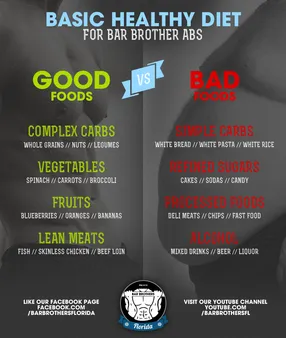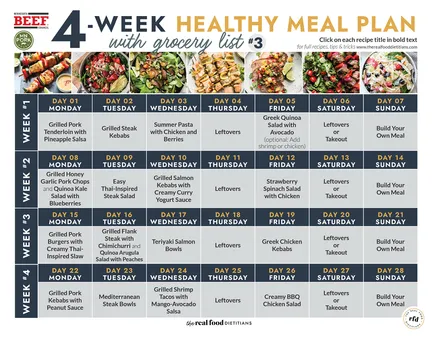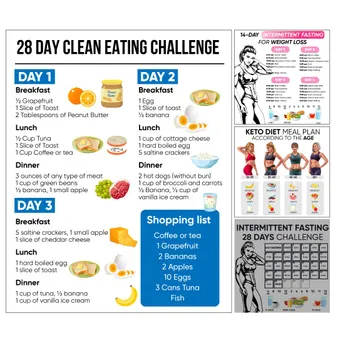Table of Contents
Calisthenics is a great way to get in shape, but it can be difficult to know what to eat to fuel your workouts. That's where a calisthenics meal plan comes in. A well-rounded calisthenics meal plan will provide you with the nutrients you need to build muscle, recover from your workouts, and perform at your best. On the Kizworld website, we have a team of s who have put together a comprehensive guide to creating a calisthenics meal plan that meets your individual needs. In this article, we will discuss the basics of a calisthenics meal plan, including what foods to eat, how much to eat, and when to eat. We will also provide you with a sample calisthenics meal plan that you can use to get started.
Calisthenics Meal Plan: The Ultimate Guide to Fueling Your Body for Success
Nutrient | Importance | Recommended Intake |
|---|---|---|
Protein | Builds and repairs muscle tissue | 1.6-2.2 grams per kilogram of body weight |
Carbohydrates | Provides energy for workouts | 4-6 grams per kilogram of body weight |
Fat | Supports hormone production and cell function | 1-1.2 grams per kilogram of body weight |
Water | Regulates body temperature and transports nutrients | 8-10 glasses per day |
I. Calisthenics Meal Plan: Fueling Your Body for Optimal Performance
Understanding the Importance of Nutrition for Calisthenics
Calisthenics, a form of bodyweight training, demands a high level of physical exertion, making proper nutrition crucial for optimal performance. A well-balanced calisthenics meal plan provides the body with the essential nutrients it needs to build and repair muscle tissue, fuel workouts, and support overall health.
Essential Macronutrients for Calisthenics
The three macronutrients—protein, carbohydrates, and fat—play vital roles in supporting calisthenics training. Protein is essential for muscle growth and repair, carbohydrates provide energy for workouts, and fat supports hormone production and cell function. The recommended daily intake of these macronutrients for calisthenics athletes varies depending on individual factors such as body weight, training intensity, and goals.
Nutrient | Importance | Recommended Intake |
|---|---|---|
Protein | Builds and repairs muscle tissue | 1.6-2.2 grams per kilogram of body weight |
Carbohydrates | Provides energy for workouts | 4-6 grams per kilogram of body weight |
Fat | Supports hormone production and cell function | 1-1.2 grams per kilogram of body weight |
Read more about the best supplements and nutrition for calisthenics
Hydration: An Essential Aspect of Calisthenics Nutrition
Hydration is paramount for calisthenics athletes, as it helps regulate body temperature, transport nutrients, and remove waste products. Dehydration can lead to fatigue, decreased performance, and even more severe health issues. Calisthenics athletes should aim to drink 8-10 glasses of water per day, especially before, during, and after workouts.
- Water is the best choice for hydration.
- Sports drinks can be beneficial during intense or prolonged workouts.
- Avoid sugary drinks, as they can dehydrate the body.
Check out our top picks for calisthenics videos and tutorials
II. Essential Macronutrients for Calisthenics
Protein
Protein is essential for building and repairing muscle tissue. It is also important for producing hormones and enzymes. Calisthenics athletes need to consume 1.6-2.2 grams of protein per kilogram of body weight each day. Good sources of protein include lean meats, poultry, fish, eggs, dairy products, and beans.
Carbohydrates
Carbohydrates provide energy for workouts. Calisthenics athletes need to consume 4-6 grams of carbohydrates per kilogram of body weight each day. Good sources of carbohydrates include whole grains, fruits, and vegetables.
Nutrient | Importance | Recommended Intake |
|---|---|---|
Protein | Builds and repairs muscle tissue | 1.6-2.2 grams per kilogram of body weight |
Carbohydrates | Provides energy for workouts | 4-6 grams per kilogram of body weight |
Fat | Supports hormone production and cell function | 1-1.2 grams per kilogram of body weight |
Water | Regulates body temperature and transports nutrients | 8-10 glasses per day |
Fat
Fat supports hormone production and cell function. Calisthenics athletes need to consume 1-1.2 grams of fat per kilogram of body weight each day. Good sources of fat include olive oil, avocados, nuts, and seeds.
Water
Water is essential for regulating body temperature and transporting nutrients. Calisthenics athletes need to drink 8-10 glasses of water per day. It is also important to drink water before, during, and after workouts.
Essential Macronutrients for Calisthenics
III. Sample Calisthenics Meal Plan
Breakfast
Start your day with a protein-packed breakfast to fuel your morning workouts. A good option is a bowl of oatmeal with berries, nuts, and a scoop of protein powder. You can also try a smoothie made with fruits, vegetables, and Greek yogurt.
Related: The Best Calisthenics Supplements and Nutrition
Meal | Calories | Protein (g) | Carbohydrates (g) | Fat (g) |
|---|---|---|---|---|
Oatmeal with berries, nuts, and protein powder | 400 | 25 | 50 | 15 |
Smoothie made with fruits, vegetables, and Greek yogurt | 350 | 20 | 40 | 10 |
Lunch
For lunch, choose a meal that is high in protein and carbohydrates to provide sustained energy throughout the afternoon. A good option is a grilled chicken salad with quinoa, vegetables, and a light dressing. You can also try a tuna sandwich on whole-wheat bread with a side of fruit.
Related: The Best Calisthenics Exercises and Variations
- Grilled chicken salad with quinoa, vegetables, and a light dressing
- Tuna sandwich on whole-wheat bread with a side of fruit
- Lentil soup with a side of whole-wheat bread
Dinner
For dinner, choose a meal that is high in protein and healthy fats to support muscle recovery and growth. A good option is a grilled salmon with roasted vegetables and brown rice. You can also try a chicken stir-fry with vegetables and a side of quinoa.
Related: How to Build Muscle and Strength with Calisthenics
Meal | Calories | Protein (g) | Carbohydrates (g) | Fat (g) |
|---|---|---|---|---|
Grilled salmon with roasted vegetables and brown rice | 500 | 30 | 50 | 20 |
Chicken stir-fry with vegetables and a side of quinoa | 450 | 25 | 40 | 15 |
Lentil soup with a side of whole-wheat bread | 400 | 20 | 40 | 10 |
Sample Calisthenics Meal Plan
IV. Hydration: An Essential Aspect of Calisthenics Nutrition
The Importance of Water
Water is essential for life and plays a vital role in many bodily functions, including regulating body temperature, transporting nutrients, and removing waste products. When you exercise, you sweat, which can lead to dehydration if you don't drink enough fluids. Dehydration can impair your performance and increase your risk of injury.
How Much Water Should You Drink?
The amount of water you need to drink each day depends on a number of factors, including your activity level, climate, and overall health. However, a good rule of thumb is to drink eight glasses of water per day. If you are exercising, you may need to drink more.
Signs of Dehydration
If you are dehydrated, you may experience symptoms such as:* Thirst* Dry mouth* Fatigue* Headache* Dizziness* Muscle cramps
How to Stay Hydrated
There are a few simple things you can do to stay hydrated:* Drink plenty of fluids throughout the day, even if you don't feel thirsty.* Choose water over sugary drinks like soda and juice.* Eat fruits and vegetables that are high in water, such as watermelon and cucumber.* Avoid caffeine and alcohol, as these can dehydrate you.
Related Posts
* How to Do a Muscle Up* The Best Calisthenics Gifts and Accessories
Nutrient | Importance | Recommended Intake |
|---|---|---|
Protein | Builds and repairs muscle tissue | 1.6-2.2 grams per kilogram of body weight |
Carbohydrates | Provides energy for workouts | 4-6 grams per kilogram of body weight |
Fat | Supports hormone production and cell function | 1-1.2 grams per kilogram of body weight |
Water | Regulates body temperature and transports nutrients | 8-10 glasses per day |
Tips for Staying Hydrated During Exercise
If you are exercising, it is important to stay hydrated to avoid dehydration. Here are a few tips:* Drink plenty of fluids before, during, and after your workout.* Choose sports drinks that contain electrolytes to help you replenish the minerals you lose through sweat.* Avoid drinking alcohol before or during your workout, as this can dehydrate you.By following these tips, you can stay hydrated and improve your performance during your calisthenics workouts.
Hydration: An Essential Aspect of Calisthenics Nutrition
V. Conclusion
In this article, we have discussed the importance of a healthy diet for calisthenics athletes. We have provided a sample meal plan that can help you fuel your workouts and recover properly. We have also included some tips for making healthy eating choices. Remember, a healthy diet is essential for achieving your calisthenics goals. By following the tips in this article, you can improve your performance and reach your full potential.